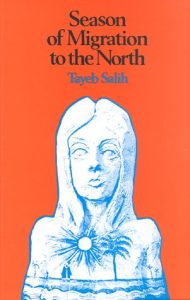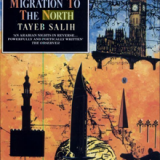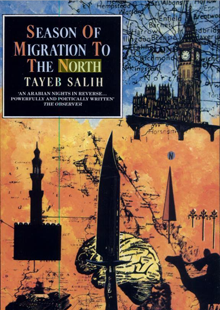Season of Migration to the North – Tayeb Salih – 1966

Posted by Bruce Ye on 25 August 2017:
Here is a good review of this book I found in Justin D. Edwards’ Postcolonial Literature:
Critics often read Salih’s text as a dramatic analysis of colonial politics, wherein a narrator realizes the danger of becoming a Europeanized Arab who wishes to wreak vengeance on the West for his ‘Orientalization’. The processes of Orientalization experienced by the anonymous narrator and one of the characters, Mustafa Sa’eed, arise out of the Europeans’ historical manufacturing of symbols, tropes and stereotypical representations when writing about, or otherwise ‘knowing’ the ‘Oriental’ (usually Arab) in order to prop up and further perpetuate racially essentialist views of the East. Most critics of Salih’s text focus on its colonial politics, from Mustafa Sa’eed’s adoption of an Oriental persona to his conquests of Englishwomen in order to avenge the ways in which the East has been penetrated and possessed by the West. Such readings of the novel usually focus on Mustafa Sa’eed and develop arguments that link the novel’s postcolonial politics to its sexual politics.
The story is told by a narrator who, after living in England for many years, returns to the small Sudanese village of his youth. Soon after his return, he uncovers the story of Mustafa Sa’eed, who has also lived in England and has recently returned to this village. The narrative reveals he becomes ‘unaffected by outside forces’ and a ‘heartless machine’. Extremely well educated and with a very bright future ahead of him, Mustafa chooses to be a conqueror, a man who shall ‘liberate Africa with [his] penis’, and who regards English women as ‘cities to be sieged’ or ‘mountain peaks’ on which to climb. In this, he reverses the European imperialist penetration of Africa (as exemplified in works such as Joseph Conrad’s Heart of Darkness) and he willingly adopts the Orientalist stereotypes disseminated in the Western discourse. He cannot be trusted; he has a thirst for power; and he is abusive to women. Moreover, by acting out a phallocentric form of hyper-masculinity, his mask fits with what Edward Said calls the Western image of the ‘lustful, phallic Oriental subject’. Mustafa thus appropriates ‘different units of Orientalist discourse’ through ‘a set of representative figures, or tropes’, ‘figures which are to the actual Orient […] as stylized costumes are to characters in a play’.
Yet the objects of his possession reveal Mustafa to be a hollow symbol constructed out of Orientalism: he is reduced to an Oriental phallic symbol of ‘cruelty and sensuality’. This appropriation and internalization of Western discourse exposes the power dynamics inherent to categories of difference. Orientalization thus plays an indispensable role in the fulfillment of Mustafa Sa’eed’s dark destiny, the violent dénouement of this novel in which sexual violence is the gruesome and excessive metaphor for the clash between colonizers and the cultures they dominate, shape, and ultimately destroy. In the end, though, Mustafa mysteriously disappears and the narrator recognizes his companion’s desire to conquer as a meaningless and bare pursuit that is destructive for the conqueror and the conquered. (22-23)














